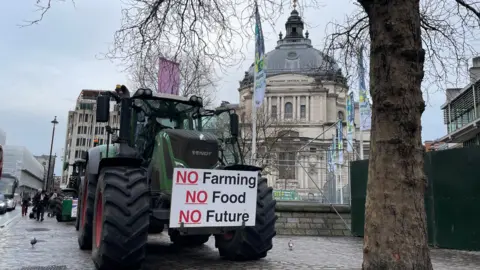In a significant move affecting agricultural practices in the UK, Members of Parliament (MPs) are advocating for a delay in the implementation of the proposed inheritance tax on farms for one additional year. This call follows backlash from farmers who have expressed deep concerns about the proposed taxation on inherited agricultural assets valued over £1 million, which would be levied at a reduced rate of 20%, half the standard inheritance tax. The announcement, made during the Autumn Budget, has sparked widespread protests among farmers across the country.
The Environment, Food and Rural Affairs (Efra) Committee released a report highlighting that the government’s changes to the inheritance tax were initiated without adequate consultations, impact assessments, or discussions around affordability. MPs are emphasizing the need for a thorough evaluation of alternative schemes that would protect small family farms from financial strain.
The government insists that the changes are crucial and that it remains steadfast in its commitment to support farmers. However, the Efra committee’s report suggests that the proposed tax reforms pose a real threat to the most vulnerable farming businesses. Delaying the enforcement of the policy until April 2027 is seen as a solution that would provide farmers the necessary time to seek professional advice amid the looming changes.
Tom Bradshaw, President of the National Farmers’ Union (NFU), voiced support for the proposed delay but pointed out that it does not alleviate the ongoing “terrible pressure” faced by older farmers. He has labeled the policy fundamentally flawed and detrimental, calling for a complete rethink. The government claims that the tax will impact only 500 wealthy farms annually; however, organizations like the NFU and the Country Land and Business Association (CLA) warn that up to 70,000 farms could potentially be impacted.
The Efra committee report also pointed to the abrupt discontinuation of the Sustainable Farming Incentive (SFI) scheme, which provided vital environmental payments to farmers, causing significant distrust towards the government. With over 50,000 farming businesses enrolled in the SFI, its closure in March was described by the NFU as yet another devastating blow to the agricultural sector.
In response to the overwhelming concerns, the Department for Environment, Food and Rural Affairs (Defra) announced that it would allow SFI applications that were already underway at the time of its closure to proceed. However, the Efra committee stressed the importance of restoring trust between farmers and the government by learning lessons from these missteps.
Efra committee chairman Alistair Carmichael addressed the growing anxiety among farmers, pointing out that the government appears to be disregarding their concerns. He referred to months of protests, including tractor demonstrations at Westminster, which reflected deep-seated discontent within the agricultural community.
Moreover, the CLA has urged the government to reconsider its “current disastrous policy” concerning the inheritance tax. They proposed an alternative “clawback” scheme that would maintain full agricultural and business property relief while applying inheritance tax only to assets sold within a designated timeframe after a death, with the tax payment derived from the sale proceeds. CLA President Victoria Vyvyan highlighted that this approach would limit potential harm to family-run businesses while targeting those who purchase land merely to exploit tax loopholes.
Despite the pushback, government representatives noted that three-quarters of estates would still not incur any inheritance tax under the reform, and those that do would pay only half of the typical tax rate. They further stated that payments could be spread over ten years without interest.
As discussions continue, the farming community remains apprehensive about the direction of agricultural policy, emphasizing the need for greater consultation and consideration of their interests in the face of sweeping changes. Key announcements concerning the new SFI scheme are expected following the upcoming spending review, amid increasing scrutiny of the government’s agricultural strategies. Farmers are left to navigate a precarious landscape of potential taxation while seeking stability in their businesses that remain fundamental to the UK’s food production and rural economy.



